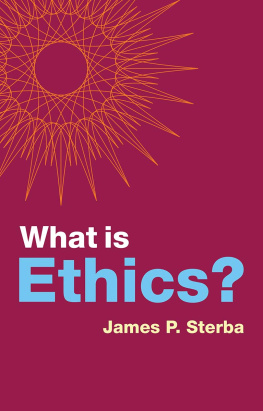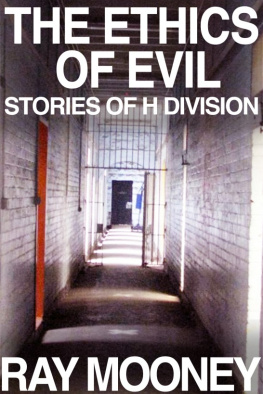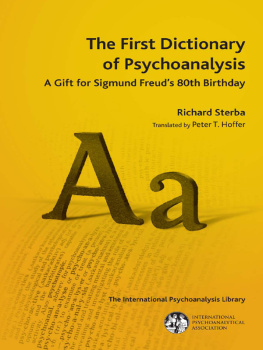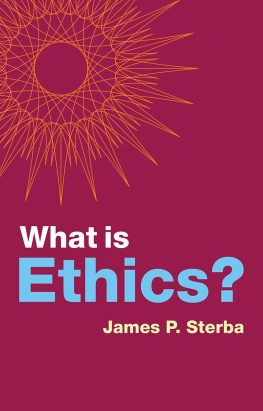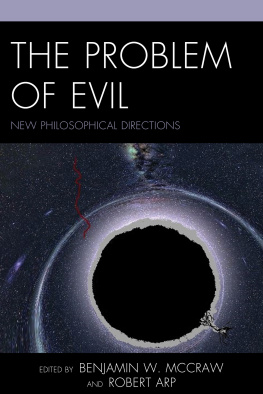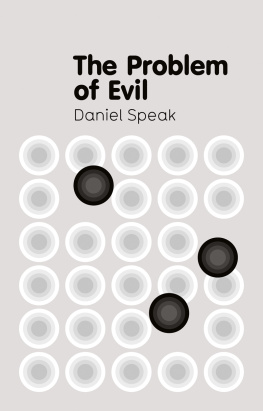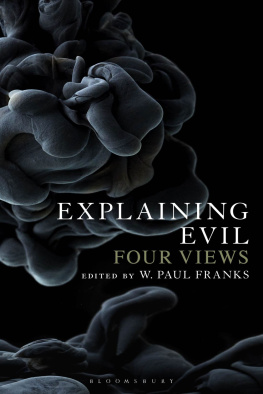Sterba - Ethics and the Problem of Evil
Here you can read online Sterba - Ethics and the Problem of Evil full text of the book (entire story) in english for free. Download pdf and epub, get meaning, cover and reviews about this ebook. year: 2017, publisher: Indiana University Press, genre: Religion. Description of the work, (preface) as well as reviews are available. Best literature library LitArk.com created for fans of good reading and offers a wide selection of genres:
Romance novel
Science fiction
Adventure
Detective
Science
History
Home and family
Prose
Art
Politics
Computer
Non-fiction
Religion
Business
Children
Humor
Choose a favorite category and find really read worthwhile books. Enjoy immersion in the world of imagination, feel the emotions of the characters or learn something new for yourself, make an fascinating discovery.

Ethics and the Problem of Evil: summary, description and annotation
We offer to read an annotation, description, summary or preface (depends on what the author of the book "Ethics and the Problem of Evil" wrote himself). If you haven't found the necessary information about the book — write in the comments, we will try to find it.
Sterba: author's other books
Who wrote Ethics and the Problem of Evil? Find out the surname, the name of the author of the book and a list of all author's works by series.
Ethics and the Problem of Evil — read online for free the complete book (whole text) full work
Below is the text of the book, divided by pages. System saving the place of the last page read, allows you to conveniently read the book "Ethics and the Problem of Evil" online for free, without having to search again every time where you left off. Put a bookmark, and you can go to the page where you finished reading at any time.
Font size:
Interval:
Bookmark:
ETHICS AND THE PROBLEM OF EVIL
INDIANA SERIES IN THE PHILOSOPHY OF RELIGION
Merold Westphal, editor
Edited by James P. Sterba

This book is a publication of
Indiana University Press
Office of Scholarly Publishing
Herman B Wells Library 350
1320 East 10th Street
Bloomington, Indiana 47405 USA
iupress.indiana.edu
2017 by Indiana University Press
All rights reserved
No part of this book may be reproduced or utilized in any form or by any means, electronic or mechanical, including photocopying and recording, or by any information storage and retrieval system, without permission in writing from the publisher. The Association of American University Presses Resolution on Permissions constitutes the only exception to this prohibition.
 The paper used in this publication meets the minimum requirements of the American National Standard for Information SciencesPermanence of Paper for Printed Library Materials, ANSI Z39.48-1992.
The paper used in this publication meets the minimum requirements of the American National Standard for Information SciencesPermanence of Paper for Printed Library Materials, ANSI Z39.48-1992.
Manufactured in the United States of America
Cataloging information is available from the Library of Congress.
ISBN 978-0-253-02425-1 (cloth)
ISBN 978-0-253-02431-2 (paperback)
ISBN 978-0-253-02438-1 (ebook)
1 2 3 4 5 22 21 20 19 18 17
Marilyn McCord Adams
John Hare
Linda Zagzebski
Laura Garcia
Bruce Russell
Stephen J. Wykstra
Stephen Maitzen
THIS COLLECTION WOULD not have been possible without the generous support of the John Templeton Foundation and the University of Notre Dame, especially the Institute for Scholarship in the Liberal Arts. I would also like to thank my colleagues and students who contributed in various ways to making this collection possible, in particular, Karl Ameriks, Robert Audi, Rebecca Chan, Ting Cho Lau, Nevin Climenhaga, Richard Cross, Dustin Crummett, Richard DeGeorge, Michael DePaul, Paul Draper, Alfred Freddoso, Gary Gutting, Liz Jackson, Janet Kourany, John Lachs, Samuel Newlands, Caleb Ontiveros, Michael Rea, Margaret Schmitt, David Solomon, Meghan Sullivan, Michael Tooley, Louise Williams, and Peter van Inwagen.
ETHICS AND THE PROBLEM OF EVIL
IN RECENT YEARS, discussion of the problem of evil has been advanced by using resources of contemporary metaphysics and epistemology such as Alvin Plantingas application of modal logic to logical problem of evil and William Rowe and Stephen Wykstras application of probabilistic epistemology to the evidential problem of evil. The results have been impressive. What is a bit surprising, however, is that philosophers currently working on the problem of evil have yet to avail themselves of relevant resources from ethical theory that could similarly advance the discussion of the problem.
For example, there is no discussion of the doctrine of double effect, or whether the ends justify the means, or how to resolve hypothetical trolley cases that have become the grist for moral philosophers ever since they were introduced by Judith Thompson and Philippa Foot. Even though cognitive psychologists now regularly employ hypothetical trolley cases to determine what parts of the brain are involved in making ethical judgments, philosophers of religion have yet to recognize the relevance of such cases to the problem of evil.
What is particularly surprising, given that most of the defenders of theism in this debate are self-identified Christian philosophers, is that the central underlying element in the doctrine of double effect, what has been called the Pauline principlenever do evil that good may come of ithas been virtually ignored by contemporary philosophers of religion despite its relevance to the problem of evil.
Thus, while the principle has been a mainstay of natural law ethics at least since the time of Aquinas (notice, for example, the fundamental role it plays in the natural law ethics of John Finnis), contemporary philosophers of religion have simply ignored it when evaluating the goods and evils that are at stake with regard to the argument from evil. Rather, they have focused on the total amount of good or evil in the world or on particularly horrendous evils and whether those evils can be compensated for.
Now it is true that the Pauline principle has been rejected as an absolute principle. This is because there clearly are exceptions to it. Surely doing evil that good may come of it is justified when the resulting evil or harm is
- 1. trivial (as in the case of stepping on someones foot to get out of a crowded subway),
- 2. easily reparable (as in the case of lying to a temporarily depressed friend to keep her from committing suicide).
There is also disagreement over whether a further exception to the principle obtains when the resulting evil or harm is:
- 3. the only way to prevent far greater harm to innocent people (as in the case of shooting one of twenty civilian hostages to prevent, in the only way possible, the execution of all twenty).
Yet despite the recognition that there are exceptions to the principle, and despite the disagreement over the extent of those exceptions, the Pauline principle still plays an important role in contemporary ethical theory.
Moreover, the widespread discussion of hypothetical trolley cases in contemporary ethical theory is frequently just another way of determining the range of application of the Pauline principle. To see this, consider the following trolley case, first put forward by Philippa Foot:
A runaway trolley is headed toward five innocent people who are on the track and who will be killed unless something is done. You can redirect the trolley on to a second track, saving the five. However, on this second track is an innocent bystander who will be killed if the trolley is turned onto this track.
Is it permissible to redirect the trolley? Would that be doing evil? Clearly your redirecting the trolley would not be intentionally doing evil. What you would intentionally be doing is trying to save the five people on the track. You would not be intentionally trying to kill one to save the five, although you would foresee that one persons death would definitely result from your action of saving five. So given that the Pauline principle, properly understood, only requires that we never intentionally do evil that good may come of it, the principle does not prohibit redirecting the trolley in this case. Moreover, not only is redirecting the trolley in this case not prohibited by the Pauline principle, it also satisfies the additional requirements for being permitted by the doctrine of double effect.
But consider another trolley case:
Again, there is a runaway trolley headed toward five innocent people who are on the track and who will be killed unless something is done. This time the only way for you to stop the trolley and save the five is to push a big guy from a bridge onto the track.
In this case, by contrast, what you are doing, pushing the big guy onto the tracks, is intentionally doing evil. You are intentionally killing this large innocent person in order to save five other innocent people. Nor arguably would your action count as an exception to the Pauline principle here, even in virtue of its contested third class of exceptions, because in this case killing one to save five would presumably be judged insufficiently beneficial to justifying the killing. Thus, pushing the big guy onto the tracks in this case would be seen to be a violation of the Pauline principle.
Next pageFont size:
Interval:
Bookmark:
Similar books «Ethics and the Problem of Evil»
Look at similar books to Ethics and the Problem of Evil. We have selected literature similar in name and meaning in the hope of providing readers with more options to find new, interesting, not yet read works.
Discussion, reviews of the book Ethics and the Problem of Evil and just readers' own opinions. Leave your comments, write what you think about the work, its meaning or the main characters. Specify what exactly you liked and what you didn't like, and why you think so.


